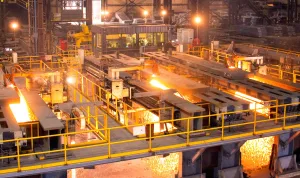Primary Factors Driving Steel Demand in Hong Kong’s Industrial Sector: Key Insights

Steel plays a crucial role in Hong Kong’s industrial sector, which relies heavily on this material for various applications ranging from construction to manufacturing. In 2024, the demand for steel in Hong Kong is influenced by several key factors, including infrastructure development, the rise of advanced manufacturing, and the push towards sustainability. In this article, we will explore the primary factors driving steel demand in Hong Kong’s industrial sector and how they are shaping the future of the market.
1. Infrastructure Development and Urbanization
One of the most significant drivers of steel demand in Hong Kong is the ongoing infrastructure development across the city. As Hong Kong continues to expand its transportation networks, public facilities, and urban landscapes, the need for high-quality steel has surged. Major projects such as the expansion of the Mass Transit Railway (MTR), the construction of new commercial buildings, and the development of housing projects all contribute to increased demand for steel. Steel’s durability, versatility, and strength make it a preferred material for these large-scale projects, where structural integrity and long-term sustainability are key priorities.
2. Renewable Energy and Green Infrastructure
The global shift towards sustainability is impacting the steel industry in Hong Kong as well. The city has committed to reducing its carbon footprint and transitioning towards renewable energy sources, which is driving demand for steel in green infrastructure projects. Solar farms, wind energy installations, and energy-efficient buildings all require specialized steel products designed to support renewable energy technologies. In addition, the push for eco-friendly building practices is leading to the use of sustainable steel materials, such as recycled steel, which reduces environmental impact without compromising quality.
3. Growth in Advanced Manufacturing
Another factor contributing to the rising demand for steel in Hong Kong’s industrial sector is the growth of advanced manufacturing. As the city shifts towards more high-tech industries such as robotics, electronics, and precision machinery, the need for specialized steel components has grown. High-strength steel, which is used in the production of advanced manufacturing equipment, is becoming increasingly important as businesses look to improve operational efficiency and product quality. This trend is expected to continue in 2024, as Hong Kong’s manufacturing sector evolves to meet the needs of a more technology-driven economy.
4. Automotive and Transportation Sector
The automotive and transportation sectors are also playing a significant role in driving steel demand in Hong Kong. As the city modernizes its transportation infrastructure, there is growing demand for lightweight and high-strength steel products that can enhance the efficiency of vehicles and public transport systems. Electric vehicles (EVs), which are gaining traction in Hong Kong as part of the city’s push towards sustainable transportation, require lightweight steel components that offer superior strength while reducing vehicle weight, thereby improving fuel efficiency and battery performance.
5. Rising Construction in Emerging Sectors
Hong Kong’s industrial sector is seeing increased demand for steel due to construction activities in emerging sectors such as technology parks, logistics hubs, and data centers. These facilities require large volumes of steel for both structural frameworks and specialized installations, such as cooling systems and secure storage. The construction of smart cities and high-tech industrial zones, supported by government initiatives, is further driving demand for steel products tailored to meet the needs of these emerging industries.
6. Environmental Regulations and Sustainable Building Practices
As environmental regulations become stricter, the construction industry in Hong Kong is being pushed to adopt more sustainable building practices. This has led to a rise in demand for eco-friendly steel that meets international standards for environmental responsibility. Recycled steel and low-carbon steel are increasingly being used in construction projects that aim to minimize carbon emissions and reduce waste. This trend is likely to accelerate in 2024 as both the public and private sectors in Hong Kong prioritize sustainability in their building strategies.
Conclusion
The demand for steel in Hong Kong’s industrial sector is being driven by a combination of infrastructure development, the rise of advanced manufacturing, sustainable building practices, and growth in key industries such as automotive and technology. As Hong Kong continues to develop its urban landscape and embrace eco-friendly solutions, the demand for high-quality, specialized steel will remain strong. Businesses and investors in the steel market must stay attuned to these trends to capitalize on the opportunities presented by this evolving market.



